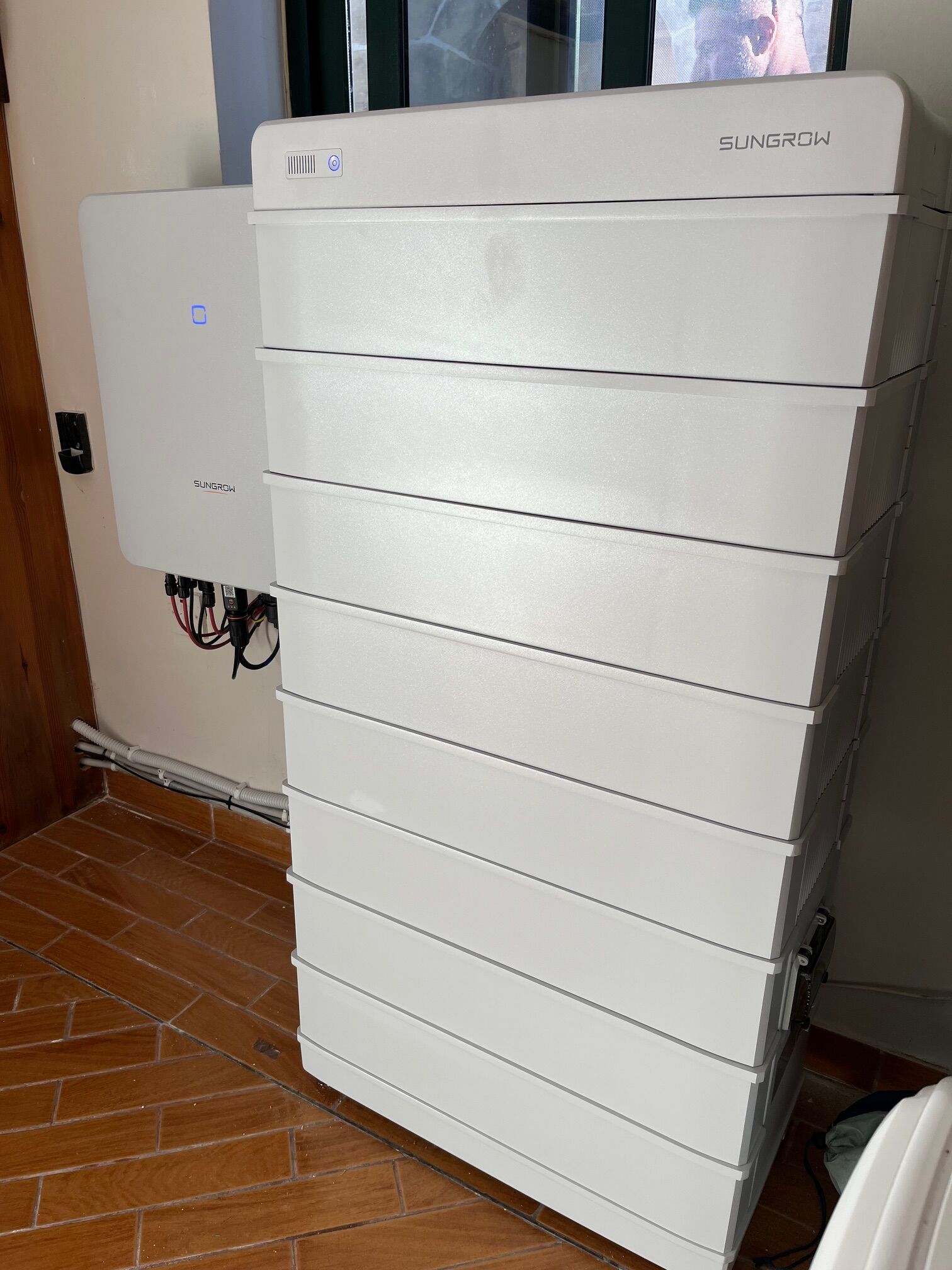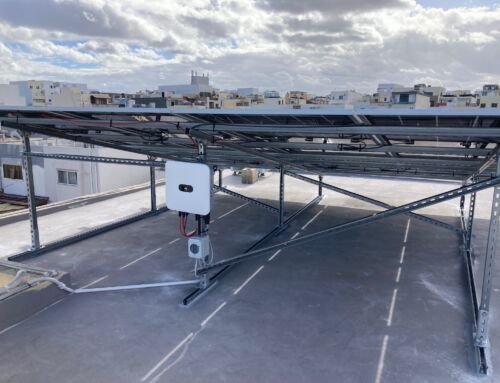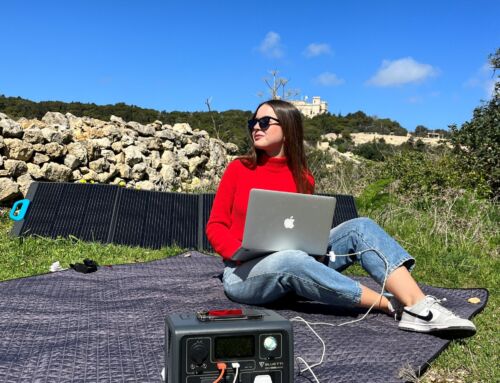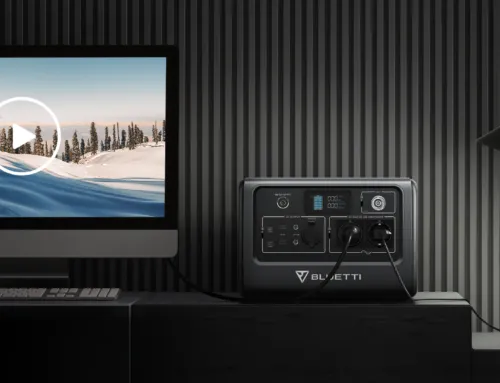Understanding and choosing the right solar battery system for your home in Malta could be a daunting task without some expert advice. Building on several years of experience of installing hundreds of household battery systems in Malta, we put together a brief guide that will help you to understand solar battery basics.
Why would your home need a battery?
Thanks to recent government grant scheme for domestic batteries, first introduced in 2021, and recently improved in February 2024 with grants of up to €7,200 per battery system, more and more Maltese households enquire about the benefits of home batteries.
Until recently, solar batteries were used mostly for off-grid applications to store solar energy for use on site. But latest advancements in battery technology, particularly the rise of lithium iron polymer phosphate (LiFeP04) cell chemistry, sparked huge interest from people who want to store their excess solar energy, whether or not they are connected to an electricity grid.
With a home battery storage system, solar energy generated during daylight hours can be stored and used in the evening or at night, thus avoiding having to import electricity from the grid. This allows households with PV systems to generate additional savings on energy bills over and above savings generated by solar panels alone.
Moreover, home batteries can provide backup power during a power cut, which is an added advantage, apart from financial savings on energy bills.
Choosing the right type of home battery
Due to wide range of energy storage systems available on the market today, selecting the right type of solar battery can be a daunting choice. Virtue Solaris has been installing domestic and commercial battery systems in Malta since 2019, both on and off-the-grid, and we have gained considerable experience in selecting the right type of battery system for our customers’ needs.
Broadly speaking, there are three most common types of battery systems for solar applications:
- Lead-acid batteries are well known for use in vehicles. Their derivatives, such as deep cycle gel batteries have been the mainstream in solar off grid systems for many years. Although this type of battery comes at a relatively low cost, it suffers from several drawbacks in comparison with other alternatives. This includes relatively low power density, limitations of charging cycle, and relatively short lifespan.
- Flow batteries store energy by pumping metal ions in dissolved liquids through a membrane. Such batteries are more suited for larger, industrial scale systems, and involve high initial investment and maintenance costs. On the other hand, flow batteries have great potential for industrial uses due to their extremely long lifespan.
- Lithium-ion batteries are presently the most common battery type used predominantly in consumer electronics. Lithium ion batteries are ideally suited for domestic solar energy storage applications, due to their compact size, modular design and scalability, high power density, long lifespan, absence of maintenance costs, high safety and relatively low cost.
Virtue Solaris offers its customers latest range of solar batteries that utilize lithium-ion cell chemistry.
Are solar batteries viable in Malta?
Until recently, many of our customers expressed scepticism about financial viability of owning a home battery system. The relatively high purchase cost and uncertain return generated doubts about whether solar batteries are a great investment. This may have indeed been the case about 5 years ago, when high feed-in solar tariffs, low import tariffs and absence of government incentives for battery systems made investment in grid connected battery systems a risky choice.
However today, situation is totally different. Feed-in tariffs for solar PV systems installed with the benefit of a government grant have been reduced from €0.165/kWh to just €0.105/kWh, making export of surplus solar energy generated during the day much less attractive. Conversely, lower feed-in tariffs encourage households to shift to self-consumption, that is to try to consume as much as possible own PV energy and to avoid having to buy energy from Enemalta at much higher tariffs.
Global developments that resulted in considerably higher energy generation costs created an uncertainty over whether energy tariffs will remain stable in the future. In the recent years, Malta heavily subsidized energy tariffs for domestic and commercial consumers, however there are doubts over whether these multi-million annual subsidies can be sustained in the future. Because of this uncertainty, Maltese households now view investment in a home battery system as being the best insurance policy against potential rise in energy tariffs in the future. This makes perfect sense, since no matter how high energy tariffs may go up, an owner of a home PV and battery system is guaranteed to offset own household consumption from own produced solar energy.
Additionally, recent spate of nation-wide power cuts undermined confidence in the ability of Enemalta’s generating capacity and distribution infrastructure to cope with increasing energy demand. Although Enemalta is continuously investing in upgrading its distribution network and is in the process of creating additional generating capacity, this process is not likely to completely eliminate power cuts any time soon. On the other hand, owners of home battery systems can be self-sufficient and enjoy power supply even during a power cut.
Finally, recent government grants scheme whereby one can get a rebate of up to 80% of the costs of a battery system, capped at €720 per kWh of storage capacity and up to maximum of €7,200 per system, has effectively reduced initial capital outlay of investing in a solar battery system to only a fraction of its market cost. This scheme has been extremely popular with Maltese consumers: in the first two months since opening of the new scheme at the end of February 2024, over 600 households have applied for a government grants incentive.
Key benefits of installing home battery system
Therefore the benefits of a solar battery for Maltese households can be summed up as:
- Security in the event of a power failure – With a home battery you always have power available, even during a power outage or an emergency.
- More efficient power consumption – While you normally only use ‘free’ power during the hours that your solar panels generate power, you store the surplus in your battery system, so that you can take advantage of it when your solar panels are not generating power.
- Reduction in costs – You save money by using less energy from the grid.
- Environmentally-friendliness – You contribute to a cleaner environment by using the generated energy more efficiently. In addition, you need less electricity from the electricity grid, which is often generated by polluting coal and gas plants.
- Energy-independence – By storing your energy, you depend on the capacity of your system, and are more independent from the electricity grid.
- Less peak-load consumption – During peak hours you relieve the energy network and contribute to a more stable public electricity network.
- Low initial investment cost, thanks to the recent government scheme.
Sizing your home battery
With solar energy alone, most Maltese households can cover about 35% or more of their electricity needs. This percentage can even be increased to 85% or more by using smart home battery systems that adapt their output according to load requirements at any given time.
By maximizing self-consumption, a household can become almost, or even completely energy independent by using a home battery. By using a battery with the right capacity, the entire average daily electricity requirement can be covered with solar energy.
But what is the right size of the battery for a home?
Battery capacity is measured in kilowatt hours (kWh) and modern (lithium) battery systems are typically modular and scalable, making it easy to find the right battery to suit your needs. Modular battery systems installed by Virtue Solaris allow scalability with the possibility of additional battery modules to be added in the future, if household energy consumption increases.
An average Maltese household tends to consume around 20kWh in a 24-hour period, although this can vary greatly amongst households, and also in different seasons. From our experience of monitoring our installations, the most suitable battery size for an average Maltese household is around 10kWh. This allows most households to almost completely eliminate import from the grid during night hours when solar panels are not producing energy, whilst leaving around 10% of battery capacity in reserve for emergency power in case a power cut occurs at night.
Another important factor is how much electricity one uses during the morning and evening hours when solar energy production is low. Indeed on average, Maltese households tend to consume most of their daily energy requirement during the period between 7am and 9am in the morning, and from 6pm to about 10pm in the evening. Sizing a battery to be able to support these consumption requirements is important.
Every household is different and there is no one-size-fits-all solution, but these factors determine what capacity a home battery should have. If you are considering purchasing a home battery, consult Virtue Solaris for best advice.
Best type of home battery system for Maltese households
Over the years, Virtue Solaris worked with various top brands of hybrid inverters and battery systems, both on and off the grid. We installed many systems using top brands like Huawei, Sungrow, Growatt, Deye, Dowell and Bluetti, and we’re very conscious of the advantages and limitations inherent in each technology, model and brand.
From our experience, currently, Huawei LUNA2000 battery system offers the best energy storage solution for Maltese households for single phase systems, whilst Sungrow with its SBR battery system and three phase hybrid inverters holds an edge in three phase residential segment. These systems are proven for their technological functionality, unparalleled safety, reliability, efficiency, award-winning design, scalability and overall value for money.
Both Huawei and Sungrow’s solar home battery systems have a scalable, modular design, and are ideally suited as a home grid-connected hybrid battery systems with off-grid power backup.
Huawei system consists of a power module and one or more battery modules with capacity of 5 kWh each. Up to three 5kWh modules can be added to a battery unit, and up to two batteries can be connected on the same system, making capacity scalable from 5kWh to 30kwh. Two batteries can be integrated in parallel in one solar panel installation. This allows a maximum storage capacity of 30 kWh per inverter.
Sungrow’s batteries start at 9.6kWh, and feature modular increase in units of 3.2kWh each up to 25.6kWh.
The LUNA2000 battery module is suitable for use with both single- and three-phase Huawei inverters, and likewise, Sungrow’s SBR batteries work with Sungrow’s three phase and single phase hybrid inverters.
Both systems are safe and reliable thanks to the lithium iron phosphate (LFP) battery cells. Defective battery modules are automatically isolated so that the system can continue to function.
Huawei hybrid inverter and battery can be integrated with a Smart Guard, which provides backup power in case of power cuts, whilst Sungrow hybrid inverters feature an in-built backup capability, which does not require external Smart Guard / backup boxes. For three phase systems, Sungrow currently holds advantage over Huawei, since its range of 3 phase hybrid inverters is capable of providing backup power across all 3 phases, whilst Huawei 3 phase system offers similar functionality but is more expensive due to need for separate three phase Smart Guard device.
All components of the system can be monitored and controlled through a smart management app, which displays a wide variety of data that can also help households to make informed decisions about their energy use.
How much does a home battery system cost?
The cost of a home battery depends on the capacity of the battery (kWh), the characteristics and the brand of the inverter used, as well as installation requirements. An existing PV system with a compatible inverter can be retrofitted with a smart battery system for as little as €1,800 after government grants.
Is solar battery worth the investment?
The average payback period or return on investment (ROI) for most battery systems in Malta is around 3 – 5 years. Households with higher energy consumption tend to recoup their investment in solar battery much faster due to avoidance of higher import tariff bands. Indeed we had customers who managed to recoup their solar battery investment in less than one year!
For most people, independence and continuous availability of power supply is by far the greatest benefit of owning a solar battery.
Activity tags




